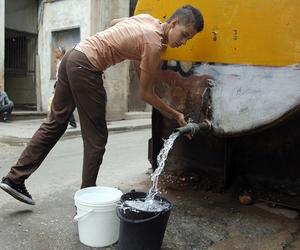US issues advisory for Cuba over cholera cases
- Submitted by: lena campos
- Health and Medicine
- 08 / 22 / 2013

The United States has issued an advisory for travelers to Cuba after several foreign visitors were sickened by cholera in recent weeks. "We urge you to follow public health recommendations and guidelines, such as safe food and water precautions and frequent hand washing to help prevent cholera infection," the diplomatic mission said in a statement published online.
The embargo against Cuba bars most American tourism to the island, but hundreds of thousands of Cuban-Americans make legal family visits each year and increasing numbers of U.S. citizens are visiting through licensed cultural exchanges. .
In a security message dated Tuesday, the U.S. Interests Section in Havana recommended visitors and U.S. citizens living on the island avoid untreated water, street food and under- or uncooked dishes such as ceviche.
‘‘We urge you to follow public health recommendations and guidelines, such as safe food and water precautions and frequent hand washing to help prevent cholera infection,’’ the diplomatic mission said in a statement published online.
The 51-year-old embargo against Cuba bars most American tourism to the island, but hundreds of thousands of Cuban-Americans make legal family visits each year and increasing numbers of U.S. citizens are visiting through licensed cultural exchanges.
According to the Pan American Health Organization there have been five confirmed cholera cases ‘‘associated with a history of travel to Cuba’’ in July and August: an Italian, two Venezuelans and two Chileans. At least three of them visited Havana.
Authorities last summer acknowledged a rare cholera outbreak originating in eastern Cuba after many years when it was unheard of on the island. They said at the time that the disease had run its course after afflicting 417 people and killing three.
In January the government announced 51 more nonfatal cases in the capital, but there has been no official word of new cases since then. Authorities did not immediately respond to a request for comment Wednesday.
In Havana, resident Carlos Rodriguez was not concerned.
‘‘If there were to be cholera, the Health Ministry has an action plan with a super-strict system of isolating (infected) people,’’ Rodriguez said. ‘‘So far I haven’t had any news about there being cholera.’’
In the past, diplomats on the island have expressed dismay at what they called Cuba’s lack of transparency on cholera statistics.
Tourism is a vital part of Cuba’s wobbly economy, bringing in more than $2.5 billion in 2011 according to the most recent statistics available.
Cholera is a waterborne disease can kill its victims quickly through severe dehydration, but it is treatable if detected in time.
Cuba has a well-organized civil defense system and scrambled to fight last year’s outbreak, with workers handing out chlorine and water purification drops and quarantining hospital patients with diarrhea. The government also mounted a campaign to raise awareness about good hygiene.
Meanwhile many Cuban doctors and nurses have experience diagnosing and treating cholera from aid missions in Haiti, where the disease has killed thousands in recent years.
‘‘In Cuba, authorities maintain active and strict clinical-epidemiological surveillance of acute diarrheal diseases, studying every suspected case,’’ the Pan American Health Organization said in its report.
Source: Boston.com
Comments